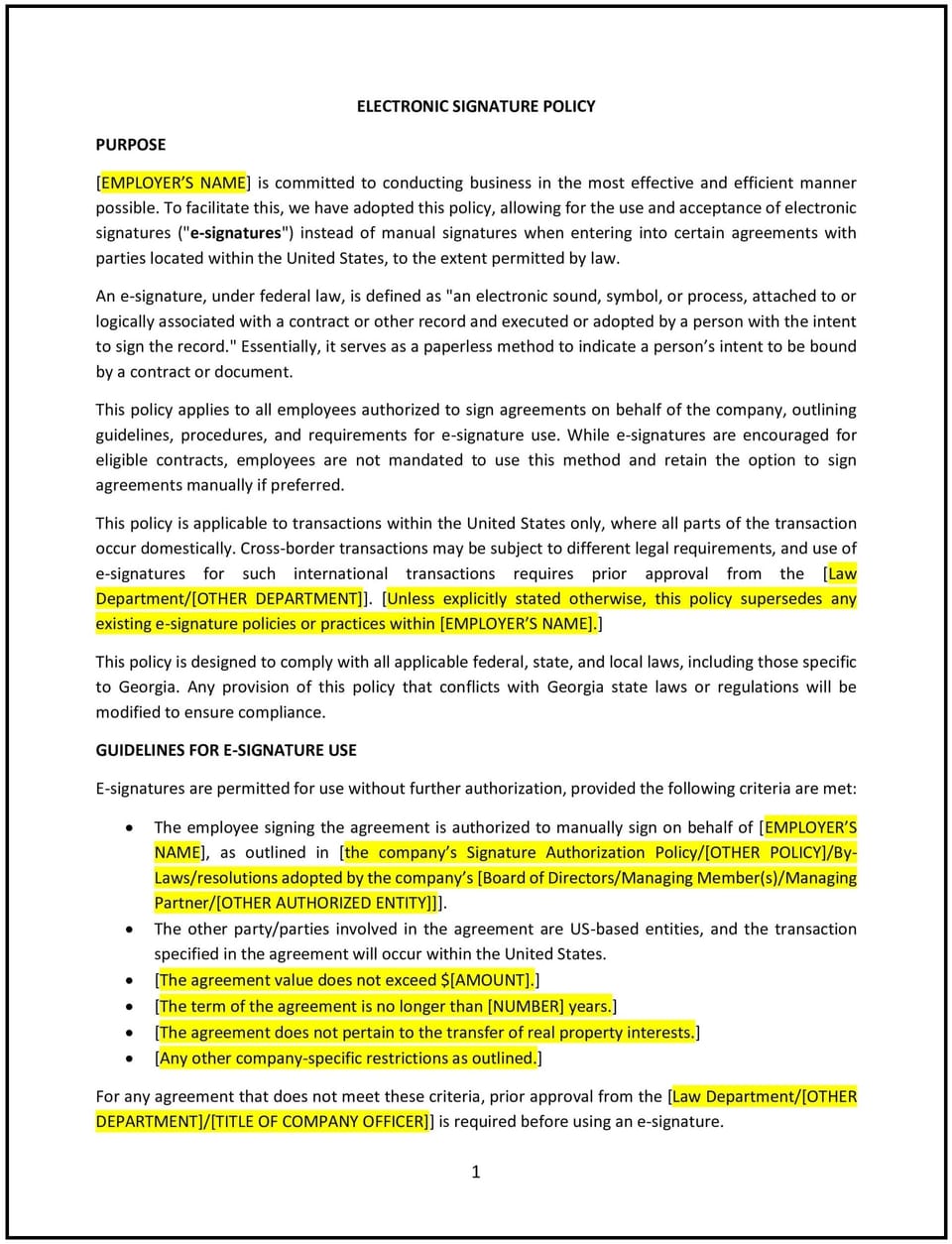Electronic signature policy (Georgia): Free template

Electronic signature policy (Georgia)
This electronic signature policy is designed to help Georgia businesses establish clear guidelines for using electronic signatures in their operations. The policy outlines acceptable use, security measures, and record-keeping practices to promote efficiency and trust in digital transactions.
By implementing this policy, businesses can streamline workflows, reduce reliance on paper, and enhance transaction security.
How to use this electronic signature policy (Georgia)
- Define electronic signatures: Specify what qualifies as an electronic signature, such as typed names, scanned images of handwritten signatures, or signatures created using digital tools.
- Identify approved platforms: List the electronic signature platforms or tools that employees and partners should use to ensure consistency and security.
- Establish usage guidelines: Provide instructions for when electronic signatures are acceptable, such as for contracts, agreements, or internal approvals.
- Address security requirements: Outline measures for protecting electronic signatures, such as encryption, authentication, and access controls.
- Include record-keeping practices: Specify how signed electronic documents should be stored, organized, and retained to ensure accessibility and reliability.
- Set limitations: Identify scenarios where electronic signatures may not be suitable, such as for specific legal or regulatory requirements in Georgia.
- Provide training: Offer training to employees on how to use electronic signature tools effectively and securely.
- Review and update regularly: Periodically review the policy to reflect changes in Georgia laws, technology, or business practices.
Benefits of using this electronic signature policy (Georgia)
Implementing this policy provides several advantages for Georgia businesses:
- Streamlines operations: Electronic signatures reduce the time and effort required for document processing and approvals.
- Enhances security: Clear guidelines for secure use protect against unauthorized access and fraudulent signatures.
- Reduces costs: Shifting to digital processes lowers expenses associated with printing, mailing, and storing paper documents.
- Improves accessibility: Electronic signatures make it easier to complete transactions remotely, supporting flexible and hybrid work models.
- Reflects Georgia-specific considerations: Tailoring the policy to local practices and legal requirements ensures its relevance and practicality.
Tips for using this electronic signature policy (Georgia)
- Use reliable platforms: Select electronic signature tools that meet industry standards for security and compliance.
- Communicate expectations: Ensure employees and partners understand when and how electronic signatures should be used.
- Monitor usage: Regularly review electronic signature transactions to identify and address any potential issues.
- Back up records: Store electronic signature documents securely with regular backups to prevent data loss.
- Adapt as needed: Update the policy to incorporate feedback, address emerging technologies, or align with changes in Georgia laws.
Q: What qualifies as an electronic signature under this policy?
A: An electronic signature includes any digital mark indicating agreement, such as a typed name, a scanned handwritten signature, or a signature generated by an approved platform.
Q: When can electronic signatures be used?
A: Electronic signatures are suitable for most business transactions, including contracts, agreements, and approvals, unless specific legal or regulatory requirements indicate otherwise.
Q: How should businesses secure electronic signatures?
A: Businesses should use encryption, authentication, and secure storage methods to protect electronic signatures from unauthorized access or misuse.
Q: Are electronic signatures legally valid in Georgia?
A: Yes, electronic signatures are generally recognized under Georgia and federal laws, such as the Uniform Electronic Transactions Act (UETA), for most transactions.
Q: How should businesses store documents with electronic signatures?
A: Businesses should store electronically signed documents in a secure digital repository with organized folders and backup systems to ensure accessibility and reliability.
Q: What happens if an unauthorized signature is detected?
A: Businesses should investigate unauthorized signatures promptly and take corrective actions, such as verifying transactions and implementing additional security measures.
Q: How often should this policy be reviewed?
A: The policy should be reviewed annually or whenever there are changes in Georgia laws, technology, or business needs related to electronic signatures.
This article contains general legal information and does not contain legal advice. Cobrief is not a law firm or a substitute for an attorney or law firm. The law is complex and changes often. For legal advice, please ask a lawyer.


